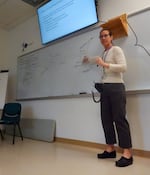
Students discuss health science topics in small groups during science class at Deer Ridge Correctional Institution on April 29, 2024. The class is part of a new transfer degree program offered at the state prison.
Tiffany Camhi / OPB
A group of Central Oregon Community College students is beginning to settle into their Monday morning science class. They find their seats at rectangular desks and begin to arrange their class materials: binders filled with printed course texts, composition books, pens and pencils and flash cards.
One of the students, 34-year-old Jordan Tippet sets out a handmade name plate made from a folded piece of paper. His first name is drawn in bubble letters, filled in with colored pencil.
Tippet is eagerly waiting for the health and fitness class to begin. ”It’s the first time in my life where I’ve kind of decided what I want to be when I grow up,” said Tippet during a class break.
Tippet envisions himself earning a bachelor’s degree in sports science and opening up his own gym someday.
But there’s an obstacle to overcome before he can achieve these new goals. Tippet is taking community college classes from inside Deer Ridge Correctional Institution, a minimum-security state prison located in Madras.
The class Tippet is taking is part of a new associate of arts transfer degree program COCC is offering to people incarcerated at Deer Ridge. For many inside the prison, the program is more than a way to pass time. It helps students like Tippet begin to see a life outside of prison. But the new program could be at risk of falling apart if the federal government doesn’t approve funding to sustain it in the long term.
The Oregon Department of Corrections offers a variety of college credit classes, workforce certificates, apprenticeships and a GED program at its facilities through partnerships with community colleges, universities and private businesses across the state. But state prisons that offer an associate or bachelor’s degree are more rare.
Transfer degree sparks future plans
The inaugural cohort of Deer Ridge students began their first term of classes in April. More than 40 people in custody at the prison applied to be in the program. Less than half — just 18 — were accepted. Tippet said he feels lucky to be a student in the program.
“I was through the roof, over the moon about it,” said Tippet. “I probably wouldn’t have this opportunity on the outside, so to be here, to do this: yeah, I’m excited.”

Jordan Gamroth (left), Sam Hannah (center) and Jordan Tippet (right) discuss a research article in their health class on April 29, 2024.
Tiffany Camhi / OPB
Tippet never saw himself as a college student. He didn’t have his high school diploma when he first entered Deer Ridge. But Tippet earned his equivalency diploma at the prison through COCC’s GED program. He saw it as an opportunity to get ahead on his education while incarcerated. When Tippet heard about a new transfer degree program, he couldn’t pass it up.
“To be in the college program is an even bigger sense of accomplishment,” said Tippet. “It makes me feel like I’m worth it and I’m not just a name and a number.”
Other students in the class are just as engaged.
Matt Kruzich, 54, is a tutor in Deer Ridge’s education department, helping GED students with math and other subjects. He also took a few college-level courses through the University of Oregon’s correspondence program. Kruzich liked the idea of learning in a classroom with a teacher again.
“One of the main lessons I learned is that I’ve got to go back to the old flash cards and re-read. You know, regular stuff that most students have to do to succeed,” said Kruzich. “I had to relearn all those skills.”

Student inmates at Deer Ridge handwrite notes and flashcards for their classes in the transfer degree program, April 29, 2024. Many have formed study groups outside of class time.
Tiffany Camhi / OPB
Being back in a classroom is also helping some students get a taste of what life will be like after incarceration. Kruzich said there’s not much that inmates are required to do while they’re in prison.
“Now we’re getting all these responsibilities on us and schedules, where we have to have work done,” said Kruzich. “I think this is a good stepping stone so we can be productive members of society.”
Bringing higher education to people incarcerated in Central Oregon
The new associate of arts transfer degree program at Deer Ridge is just the fourth of its kind in the state. Emma Chaput, a COCC biology professor, was the main driver behind it. Education equity has always been a top priority for her.
“When you look at the mission of our college, it’s to provide high-quality educational opportunities to all members of our community,” said Chaput. “We are a community college and these students are our community members.”
Chaput said she was inspired to bring more education opportunities to people incarcerated at Deer Ridge after attending a summer residency on prison education at Bard College in New York in 2022. Her original idea to add a science class to Deer Ridge’s educational offerings grew into a plan for an entire associate of arts transfer degree. Students who earn this type of degree can easily transfer credits to bachelor’s degree programs at any four-year university in Oregon.

Central Oregon Community College biology professor Emma Chaput teaches a health and fitness class at Deer Ridge on April 29, 2024. Chaput was integral in developing the transfer degree program at the prison.
Tiffany Camhi / OPB
Colleagues Chaput brought the idea to were supportive. So was the president of COCC. But funding it was a problem. A possible solution started to emerge around the same time Chaput was developing her idea.
In 2021, Congress restored Pell Grant eligibility to people incarcerated in the U.S. As the U.S. Department of Education’s largest form of need-based assistance for undergraduates, Pell Grants play a key role in student financial aid. And since this form of aid is not a loan, it does not add to student debt. Before the change three years ago, the prison population had been barred from receiving Pell Grants for decades. Chaput could see a path forward that could sustain a new transfer degree program with full funding from the federal government.
Related: Federal grants restored for incarcerated students
Waiting on Pell
There are three steps to bringing in new prison education programs funded by federal Pell Grants: accreditation of the proposed program, approval from a corrections agency and finally approval from the Education Department.
The new associate of arts degree at Deer Ridge has two out of three done.
“We are still waiting for the Pell answer,” said Chaput. “COCC submitted our application in December and it’s just been crickets.”
The new program received accreditation by the Northwest Commission on Colleges and Universities, a nonprofit regional accreditation agency, last year. COCC already has existing education programs with the state corrections department. It didn’t run into any hiccups with an additional approval.
Prison education Pell Grants officially came online nearly a year ago, in July 2023. Since then, only one program in the nation — a partnership between the California Department of Corrections and Rehabilitation and California State Polytechnic University, Humboldt, in Northern California — has been deemed eligible. About 50 applications for this type of Pell Grant could be approved by the end of this year, according to an emailed response from an Education Department spokesperson.
The relaunch of this federal program comes as the Education Department is dealing with the bungled rollout of an effort to simplify the financial aid process, known as Better FAFSA. The revamped Free Application for Federal Student Aid has been plagued by repeated delays and technical glitches. It’s unclear if the delay in awarding prison education Pell Grants is connected to this year’s wider FAFSA issues, but at the very least, the FAFSA problems have taken up much of the Education Department’s attention.
Related: FAFSA mishaps trip up college-bound Oregonians

Adults in custody at Deer Ridge become students during class time at the facility, April 29, 2024. But reminders of their incarceration, like periodic "out counts," are spread throughout the day too.
Tiffany Camhi / OPB
For now, COCC is using state money to fund the new degree program at Deer Ridge. In an effort known as Bridge to Pell, the state legislature allocated just over $300,000 in 2023 to go towards universities and community colleges seeking Pell Grant approval in Oregon prisons. But the emergency funding was only meant to last for one school year — and the money is running out.
Chaput is hoping COCC’s Pell Grant application will be approved before next fall, when the next cohort of Deer Ridge students is scheduled to start classes. The Education Department would not comment on the status of COCC’s application, but a spokesperson said no application has been denied so far. Chaput said she’ll pursue funding from the community college, as well as other external sources if the program is not approved in time.
Students look ahead to post-release plans
Midway through the program’s first 10-week term, several inmates said they feel honored to be in the first cohort. Many are planning their career trajectories after earning the degree and serving their time. A number of them have families waiting for them outside of Deer Ridge too.
Brandon Rivera Castro, 25, said setting a good example for his young daughter is a big motivator for him.

"There is hope out there and all it takes is to really want it," said Brandon Rivera Castro on April 29, 2024.
Tiffany Camhi / OPB
“Even though I’m incarcerated, I always try to be the best person and the best dad I can be,” said Rivera Castro. “When I get this associate’s degree, I’ll be able to tell my daughter that anybody can do it. I did it in incarceration — so there’s no excuse.”
The program has also brought a renewed sense of community and intention to the students. They study together, check on each other and celebrate wins in the classes. ”It gives you purpose,” said Rivera Castro. “Every day, you wake up, and you’re so happy because you got something to do that’s conducive to your life.”
Most associate of arts transfer degree programs take two years for students to complete. The program at Deer Ridge will take three. Some of the men in the program will be able to finish the entire program while incarcerated. Others will complete their sentences before the three years are up. That’s the case for both Tippet and Rivera Castro. They both plan to finish the transfer degree at a COCC campus in Central Oregon.
Getting the transfer degree is all about moving forward, said Tippet.
“We’re not defined by what we’ve done,” said Tippet. “It’s the growth that comes after that that’s probably the most important part of this whole thing.”
Rivera Castro is not sure what he’ll do next after earning the degree. He could see himself at the University of Oregon, possibly studying engineering. Rivera Castro hopes other incarcerated people will get this opportunity too.
“I feel with education you can achieve self actuality,” said Rivera Castro. “I think that’s the best thing the community can get out of it.”
